Interpersonal Communication Skills for Nurses Essay
VerifiedAdded on 2022/12/27
|7
|1920
|99
Essay
AI Summary
This essay delves into the critical role of interpersonal communication skills in the nursing profession. It emphasizes the significance of active listening, effective feedback, and insightful questioning in building strong nurse-patient relationships and ensuring optimal patient care. The essay highlights how these skills contribute to accurate assessment, improved treatment adherence, and enhanced patient satisfaction. The author discusses how nurses utilize listening to understand patient needs, provide feedback to motivate patients, and employ questioning to gather essential information for effective treatment. The conclusion underscores the importance of these communication skills in fostering trust, respect, and collaboration within the healthcare environment, ultimately improving patient outcomes. The essay also references how poor listening skills can cause wrong assumptions and presumptions regarding the physical and medical needs of the patients, which, sometimes, can be fatal and dangerous.
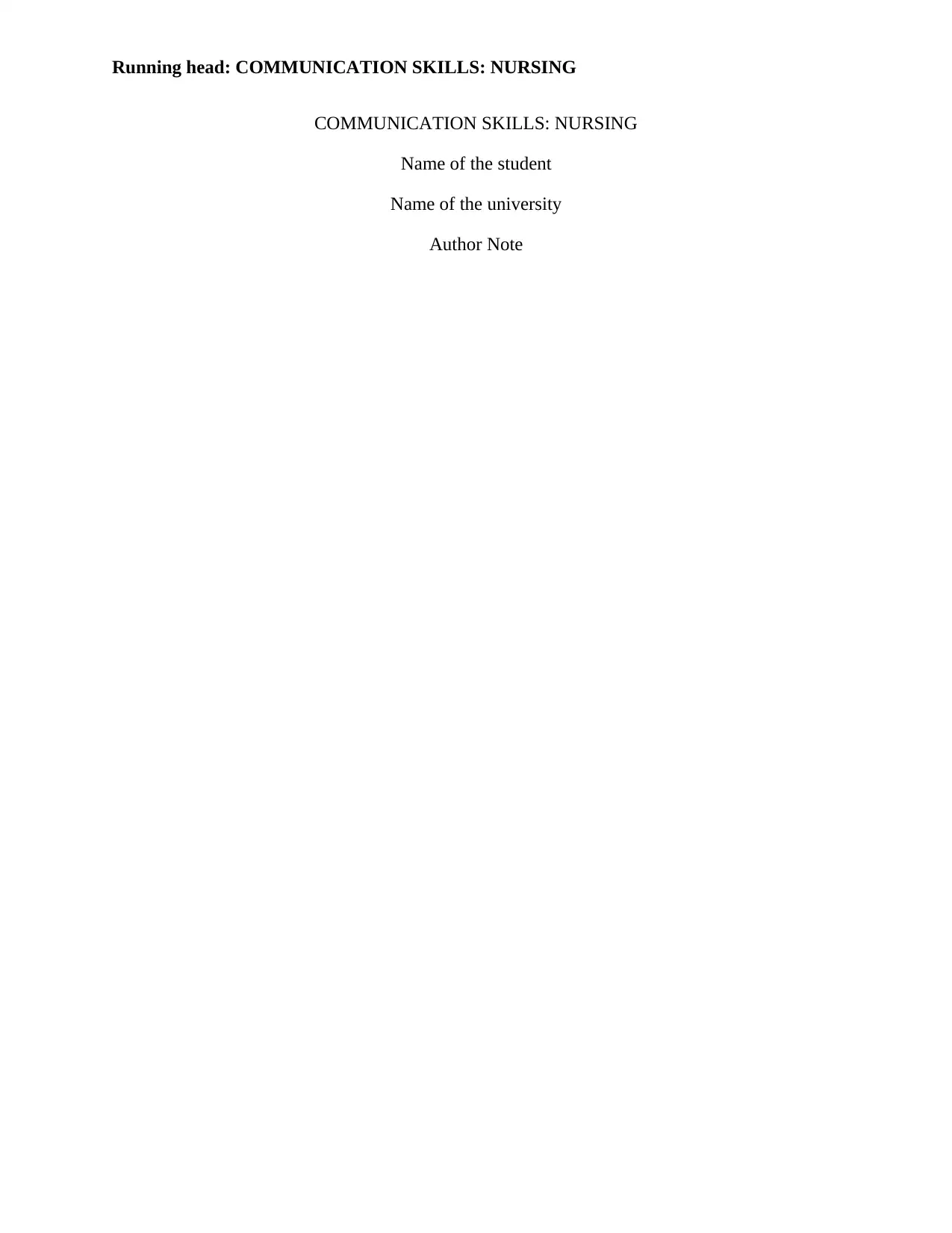
Running head: COMMUNICATION SKILLS: NURSING
COMMUNICATION SKILLS: NURSING
Name of the student
Name of the university
Author Note
COMMUNICATION SKILLS: NURSING
Name of the student
Name of the university
Author Note
Paraphrase This Document
Need a fresh take? Get an instant paraphrase of this document with our AI Paraphraser
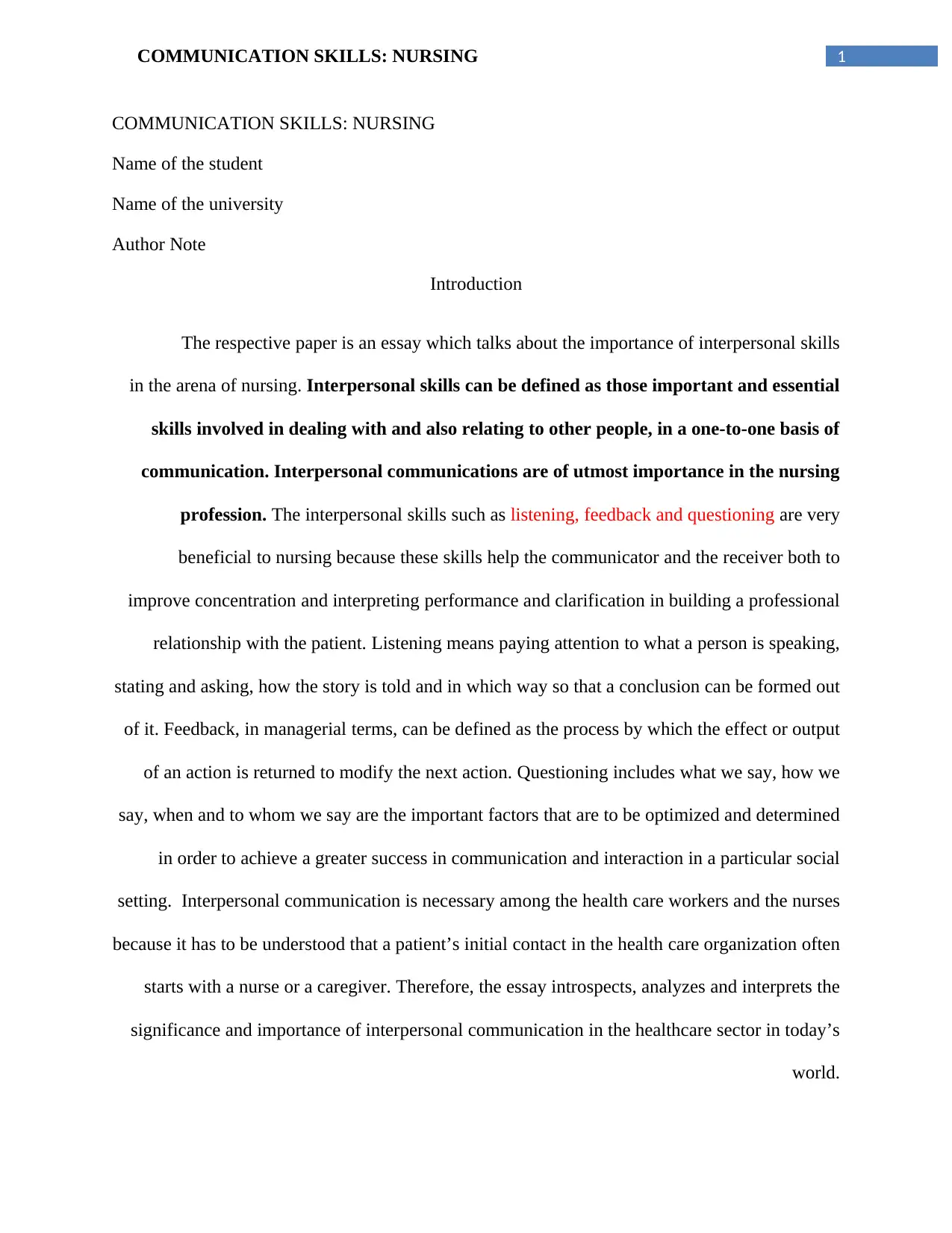
1COMMUNICATION SKILLS: NURSING
COMMUNICATION SKILLS: NURSING
Name of the student
Name of the university
Author Note
Introduction
The respective paper is an essay which talks about the importance of interpersonal skills
in the arena of nursing. Interpersonal skills can be defined as those important and essential
skills involved in dealing with and also relating to other people, in a one-to-one basis of
communication. Interpersonal communications are of utmost importance in the nursing
profession. The interpersonal skills such as listening, feedback and questioning are very
beneficial to nursing because these skills help the communicator and the receiver both to
improve concentration and interpreting performance and clarification in building a professional
relationship with the patient. Listening means paying attention to what a person is speaking,
stating and asking, how the story is told and in which way so that a conclusion can be formed out
of it. Feedback, in managerial terms, can be defined as the process by which the effect or output
of an action is returned to modify the next action. Questioning includes what we say, how we
say, when and to whom we say are the important factors that are to be optimized and determined
in order to achieve a greater success in communication and interaction in a particular social
setting. Interpersonal communication is necessary among the health care workers and the nurses
because it has to be understood that a patient’s initial contact in the health care organization often
starts with a nurse or a caregiver. Therefore, the essay introspects, analyzes and interprets the
significance and importance of interpersonal communication in the healthcare sector in today’s
world.
COMMUNICATION SKILLS: NURSING
Name of the student
Name of the university
Author Note
Introduction
The respective paper is an essay which talks about the importance of interpersonal skills
in the arena of nursing. Interpersonal skills can be defined as those important and essential
skills involved in dealing with and also relating to other people, in a one-to-one basis of
communication. Interpersonal communications are of utmost importance in the nursing
profession. The interpersonal skills such as listening, feedback and questioning are very
beneficial to nursing because these skills help the communicator and the receiver both to
improve concentration and interpreting performance and clarification in building a professional
relationship with the patient. Listening means paying attention to what a person is speaking,
stating and asking, how the story is told and in which way so that a conclusion can be formed out
of it. Feedback, in managerial terms, can be defined as the process by which the effect or output
of an action is returned to modify the next action. Questioning includes what we say, how we
say, when and to whom we say are the important factors that are to be optimized and determined
in order to achieve a greater success in communication and interaction in a particular social
setting. Interpersonal communication is necessary among the health care workers and the nurses
because it has to be understood that a patient’s initial contact in the health care organization often
starts with a nurse or a caregiver. Therefore, the essay introspects, analyzes and interprets the
significance and importance of interpersonal communication in the healthcare sector in today’s
world.
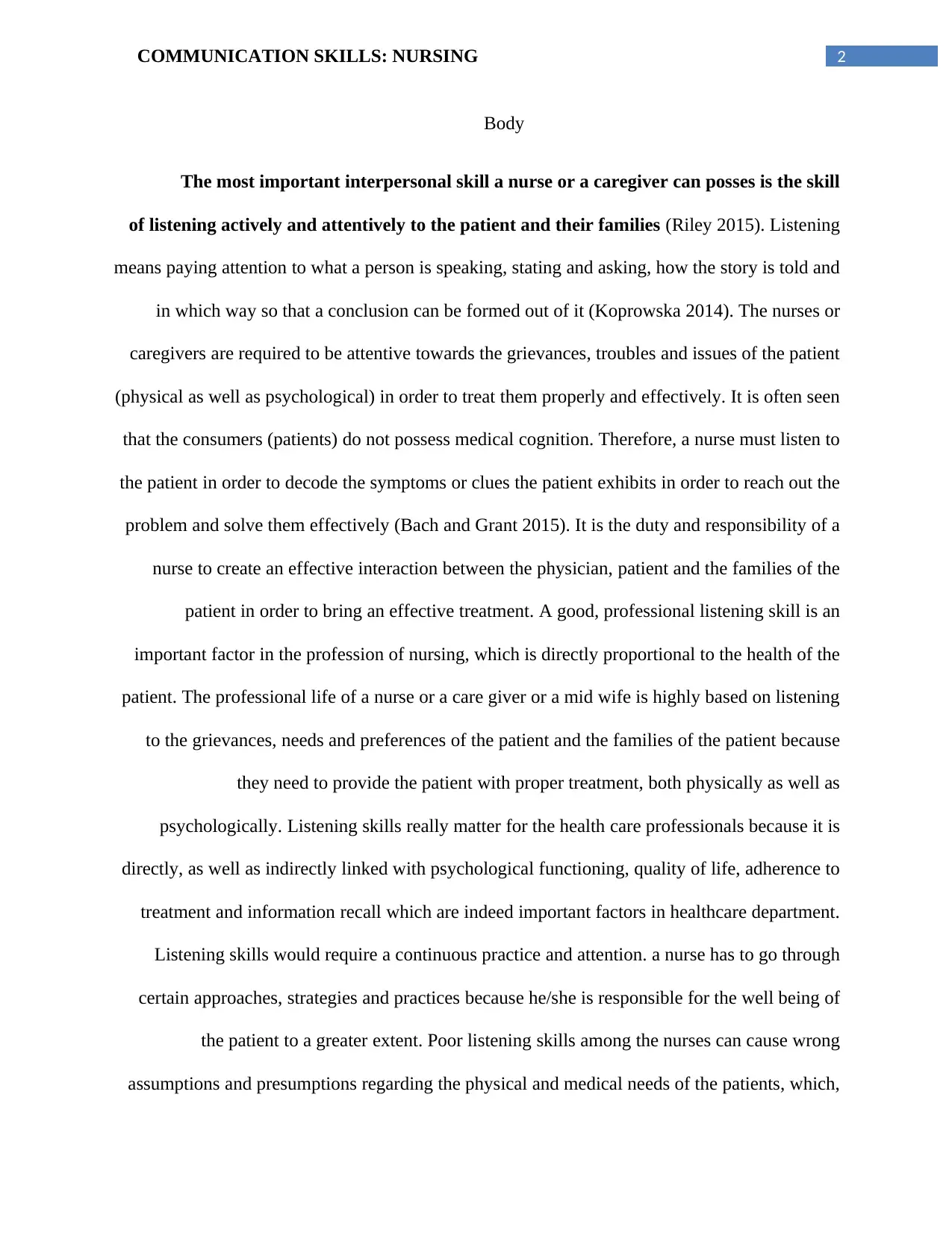
2COMMUNICATION SKILLS: NURSING
Body
The most important interpersonal skill a nurse or a caregiver can posses is the skill
of listening actively and attentively to the patient and their families (Riley 2015). Listening
means paying attention to what a person is speaking, stating and asking, how the story is told and
in which way so that a conclusion can be formed out of it (Koprowska 2014). The nurses or
caregivers are required to be attentive towards the grievances, troubles and issues of the patient
(physical as well as psychological) in order to treat them properly and effectively. It is often seen
that the consumers (patients) do not possess medical cognition. Therefore, a nurse must listen to
the patient in order to decode the symptoms or clues the patient exhibits in order to reach out the
problem and solve them effectively (Bach and Grant 2015). It is the duty and responsibility of a
nurse to create an effective interaction between the physician, patient and the families of the
patient in order to bring an effective treatment. A good, professional listening skill is an
important factor in the profession of nursing, which is directly proportional to the health of the
patient. The professional life of a nurse or a care giver or a mid wife is highly based on listening
to the grievances, needs and preferences of the patient and the families of the patient because
they need to provide the patient with proper treatment, both physically as well as
psychologically. Listening skills really matter for the health care professionals because it is
directly, as well as indirectly linked with psychological functioning, quality of life, adherence to
treatment and information recall which are indeed important factors in healthcare department.
Listening skills would require a continuous practice and attention. a nurse has to go through
certain approaches, strategies and practices because he/she is responsible for the well being of
the patient to a greater extent. Poor listening skills among the nurses can cause wrong
assumptions and presumptions regarding the physical and medical needs of the patients, which,
Body
The most important interpersonal skill a nurse or a caregiver can posses is the skill
of listening actively and attentively to the patient and their families (Riley 2015). Listening
means paying attention to what a person is speaking, stating and asking, how the story is told and
in which way so that a conclusion can be formed out of it (Koprowska 2014). The nurses or
caregivers are required to be attentive towards the grievances, troubles and issues of the patient
(physical as well as psychological) in order to treat them properly and effectively. It is often seen
that the consumers (patients) do not possess medical cognition. Therefore, a nurse must listen to
the patient in order to decode the symptoms or clues the patient exhibits in order to reach out the
problem and solve them effectively (Bach and Grant 2015). It is the duty and responsibility of a
nurse to create an effective interaction between the physician, patient and the families of the
patient in order to bring an effective treatment. A good, professional listening skill is an
important factor in the profession of nursing, which is directly proportional to the health of the
patient. The professional life of a nurse or a care giver or a mid wife is highly based on listening
to the grievances, needs and preferences of the patient and the families of the patient because
they need to provide the patient with proper treatment, both physically as well as
psychologically. Listening skills really matter for the health care professionals because it is
directly, as well as indirectly linked with psychological functioning, quality of life, adherence to
treatment and information recall which are indeed important factors in healthcare department.
Listening skills would require a continuous practice and attention. a nurse has to go through
certain approaches, strategies and practices because he/she is responsible for the well being of
the patient to a greater extent. Poor listening skills among the nurses can cause wrong
assumptions and presumptions regarding the physical and medical needs of the patients, which,
⊘ This is a preview!⊘
Do you want full access?
Subscribe today to unlock all pages.

Trusted by 1+ million students worldwide
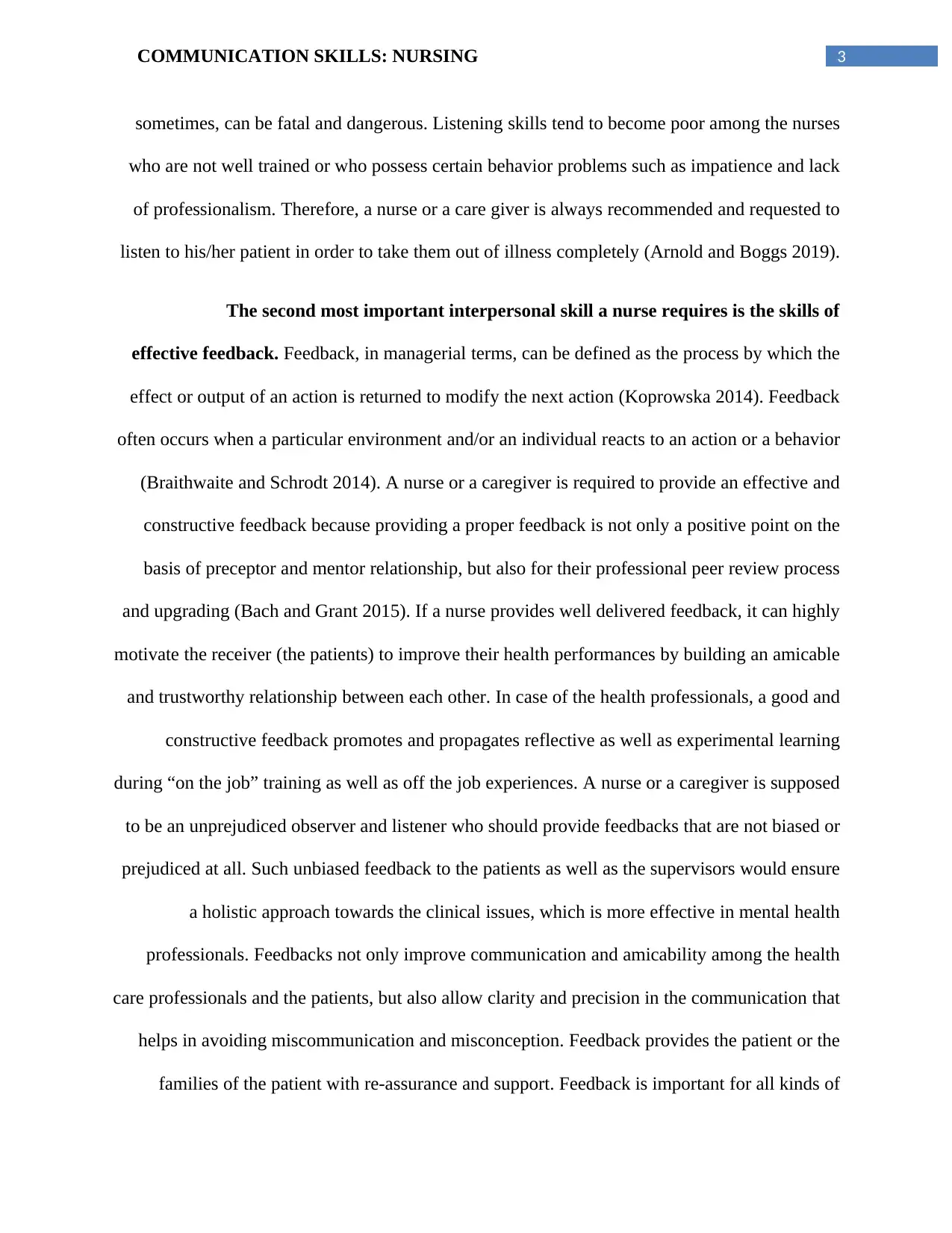
3COMMUNICATION SKILLS: NURSING
sometimes, can be fatal and dangerous. Listening skills tend to become poor among the nurses
who are not well trained or who possess certain behavior problems such as impatience and lack
of professionalism. Therefore, a nurse or a care giver is always recommended and requested to
listen to his/her patient in order to take them out of illness completely (Arnold and Boggs 2019).
The second most important interpersonal skill a nurse requires is the skills of
effective feedback. Feedback, in managerial terms, can be defined as the process by which the
effect or output of an action is returned to modify the next action (Koprowska 2014). Feedback
often occurs when a particular environment and/or an individual reacts to an action or a behavior
(Braithwaite and Schrodt 2014). A nurse or a caregiver is required to provide an effective and
constructive feedback because providing a proper feedback is not only a positive point on the
basis of preceptor and mentor relationship, but also for their professional peer review process
and upgrading (Bach and Grant 2015). If a nurse provides well delivered feedback, it can highly
motivate the receiver (the patients) to improve their health performances by building an amicable
and trustworthy relationship between each other. In case of the health professionals, a good and
constructive feedback promotes and propagates reflective as well as experimental learning
during “on the job” training as well as off the job experiences. A nurse or a caregiver is supposed
to be an unprejudiced observer and listener who should provide feedbacks that are not biased or
prejudiced at all. Such unbiased feedback to the patients as well as the supervisors would ensure
a holistic approach towards the clinical issues, which is more effective in mental health
professionals. Feedbacks not only improve communication and amicability among the health
care professionals and the patients, but also allow clarity and precision in the communication that
helps in avoiding miscommunication and misconception. Feedback provides the patient or the
families of the patient with re-assurance and support. Feedback is important for all kinds of
sometimes, can be fatal and dangerous. Listening skills tend to become poor among the nurses
who are not well trained or who possess certain behavior problems such as impatience and lack
of professionalism. Therefore, a nurse or a care giver is always recommended and requested to
listen to his/her patient in order to take them out of illness completely (Arnold and Boggs 2019).
The second most important interpersonal skill a nurse requires is the skills of
effective feedback. Feedback, in managerial terms, can be defined as the process by which the
effect or output of an action is returned to modify the next action (Koprowska 2014). Feedback
often occurs when a particular environment and/or an individual reacts to an action or a behavior
(Braithwaite and Schrodt 2014). A nurse or a caregiver is required to provide an effective and
constructive feedback because providing a proper feedback is not only a positive point on the
basis of preceptor and mentor relationship, but also for their professional peer review process
and upgrading (Bach and Grant 2015). If a nurse provides well delivered feedback, it can highly
motivate the receiver (the patients) to improve their health performances by building an amicable
and trustworthy relationship between each other. In case of the health professionals, a good and
constructive feedback promotes and propagates reflective as well as experimental learning
during “on the job” training as well as off the job experiences. A nurse or a caregiver is supposed
to be an unprejudiced observer and listener who should provide feedbacks that are not biased or
prejudiced at all. Such unbiased feedback to the patients as well as the supervisors would ensure
a holistic approach towards the clinical issues, which is more effective in mental health
professionals. Feedbacks not only improve communication and amicability among the health
care professionals and the patients, but also allow clarity and precision in the communication that
helps in avoiding miscommunication and misconception. Feedback provides the patient or the
families of the patient with re-assurance and support. Feedback is important for all kinds of
Paraphrase This Document
Need a fresh take? Get an instant paraphrase of this document with our AI Paraphraser
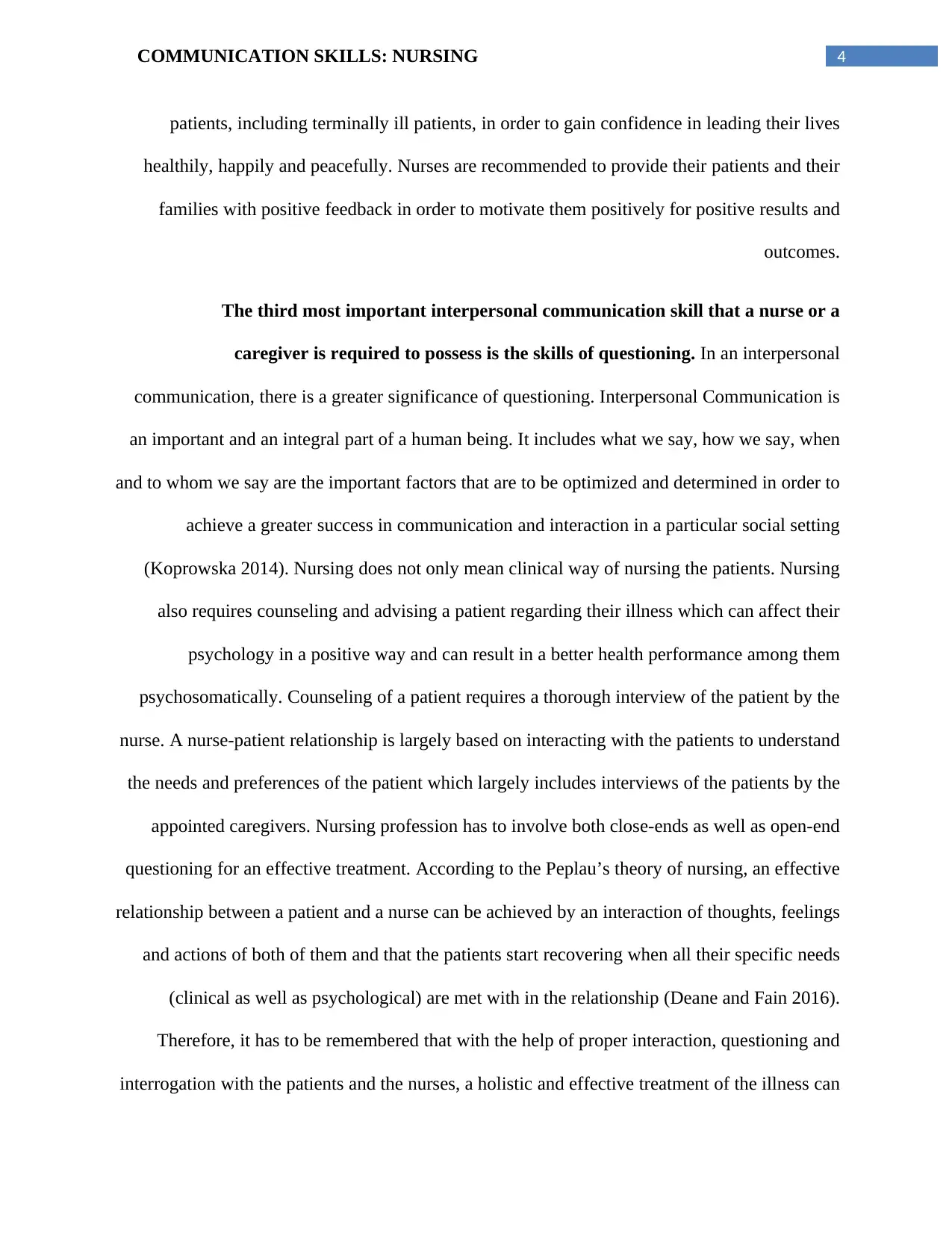
4COMMUNICATION SKILLS: NURSING
patients, including terminally ill patients, in order to gain confidence in leading their lives
healthily, happily and peacefully. Nurses are recommended to provide their patients and their
families with positive feedback in order to motivate them positively for positive results and
outcomes.
The third most important interpersonal communication skill that a nurse or a
caregiver is required to possess is the skills of questioning. In an interpersonal
communication, there is a greater significance of questioning. Interpersonal Communication is
an important and an integral part of a human being. It includes what we say, how we say, when
and to whom we say are the important factors that are to be optimized and determined in order to
achieve a greater success in communication and interaction in a particular social setting
(Koprowska 2014). Nursing does not only mean clinical way of nursing the patients. Nursing
also requires counseling and advising a patient regarding their illness which can affect their
psychology in a positive way and can result in a better health performance among them
psychosomatically. Counseling of a patient requires a thorough interview of the patient by the
nurse. A nurse-patient relationship is largely based on interacting with the patients to understand
the needs and preferences of the patient which largely includes interviews of the patients by the
appointed caregivers. Nursing profession has to involve both close-ends as well as open-end
questioning for an effective treatment. According to the Peplau’s theory of nursing, an effective
relationship between a patient and a nurse can be achieved by an interaction of thoughts, feelings
and actions of both of them and that the patients start recovering when all their specific needs
(clinical as well as psychological) are met with in the relationship (Deane and Fain 2016).
Therefore, it has to be remembered that with the help of proper interaction, questioning and
interrogation with the patients and the nurses, a holistic and effective treatment of the illness can
patients, including terminally ill patients, in order to gain confidence in leading their lives
healthily, happily and peacefully. Nurses are recommended to provide their patients and their
families with positive feedback in order to motivate them positively for positive results and
outcomes.
The third most important interpersonal communication skill that a nurse or a
caregiver is required to possess is the skills of questioning. In an interpersonal
communication, there is a greater significance of questioning. Interpersonal Communication is
an important and an integral part of a human being. It includes what we say, how we say, when
and to whom we say are the important factors that are to be optimized and determined in order to
achieve a greater success in communication and interaction in a particular social setting
(Koprowska 2014). Nursing does not only mean clinical way of nursing the patients. Nursing
also requires counseling and advising a patient regarding their illness which can affect their
psychology in a positive way and can result in a better health performance among them
psychosomatically. Counseling of a patient requires a thorough interview of the patient by the
nurse. A nurse-patient relationship is largely based on interacting with the patients to understand
the needs and preferences of the patient which largely includes interviews of the patients by the
appointed caregivers. Nursing profession has to involve both close-ends as well as open-end
questioning for an effective treatment. According to the Peplau’s theory of nursing, an effective
relationship between a patient and a nurse can be achieved by an interaction of thoughts, feelings
and actions of both of them and that the patients start recovering when all their specific needs
(clinical as well as psychological) are met with in the relationship (Deane and Fain 2016).
Therefore, it has to be remembered that with the help of proper interaction, questioning and
interrogation with the patients and the nurses, a holistic and effective treatment of the illness can
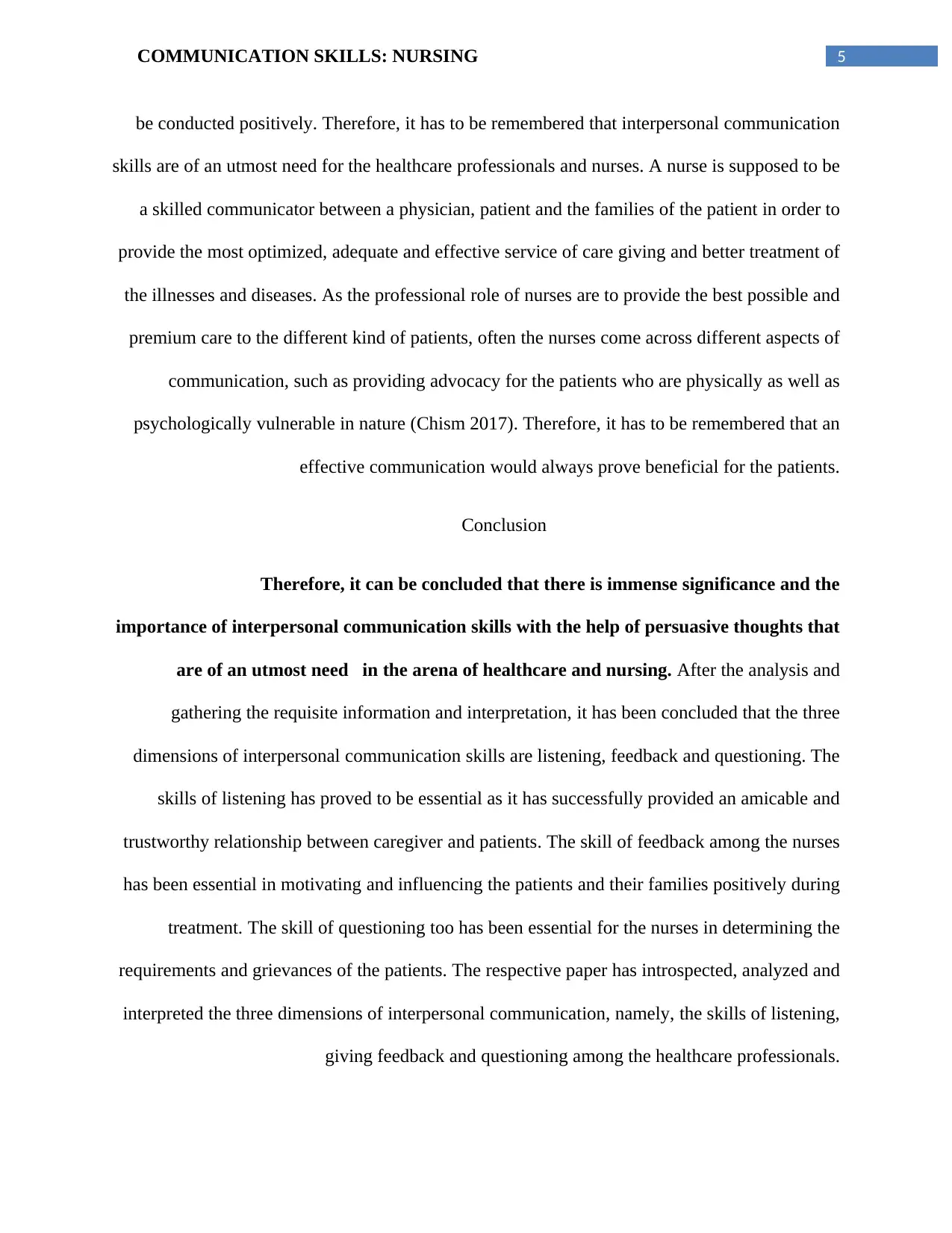
5COMMUNICATION SKILLS: NURSING
be conducted positively. Therefore, it has to be remembered that interpersonal communication
skills are of an utmost need for the healthcare professionals and nurses. A nurse is supposed to be
a skilled communicator between a physician, patient and the families of the patient in order to
provide the most optimized, adequate and effective service of care giving and better treatment of
the illnesses and diseases. As the professional role of nurses are to provide the best possible and
premium care to the different kind of patients, often the nurses come across different aspects of
communication, such as providing advocacy for the patients who are physically as well as
psychologically vulnerable in nature (Chism 2017). Therefore, it has to be remembered that an
effective communication would always prove beneficial for the patients.
Conclusion
Therefore, it can be concluded that there is immense significance and the
importance of interpersonal communication skills with the help of persuasive thoughts that
are of an utmost need in the arena of healthcare and nursing. After the analysis and
gathering the requisite information and interpretation, it has been concluded that the three
dimensions of interpersonal communication skills are listening, feedback and questioning. The
skills of listening has proved to be essential as it has successfully provided an amicable and
trustworthy relationship between caregiver and patients. The skill of feedback among the nurses
has been essential in motivating and influencing the patients and their families positively during
treatment. The skill of questioning too has been essential for the nurses in determining the
requirements and grievances of the patients. The respective paper has introspected, analyzed and
interpreted the three dimensions of interpersonal communication, namely, the skills of listening,
giving feedback and questioning among the healthcare professionals.
be conducted positively. Therefore, it has to be remembered that interpersonal communication
skills are of an utmost need for the healthcare professionals and nurses. A nurse is supposed to be
a skilled communicator between a physician, patient and the families of the patient in order to
provide the most optimized, adequate and effective service of care giving and better treatment of
the illnesses and diseases. As the professional role of nurses are to provide the best possible and
premium care to the different kind of patients, often the nurses come across different aspects of
communication, such as providing advocacy for the patients who are physically as well as
psychologically vulnerable in nature (Chism 2017). Therefore, it has to be remembered that an
effective communication would always prove beneficial for the patients.
Conclusion
Therefore, it can be concluded that there is immense significance and the
importance of interpersonal communication skills with the help of persuasive thoughts that
are of an utmost need in the arena of healthcare and nursing. After the analysis and
gathering the requisite information and interpretation, it has been concluded that the three
dimensions of interpersonal communication skills are listening, feedback and questioning. The
skills of listening has proved to be essential as it has successfully provided an amicable and
trustworthy relationship between caregiver and patients. The skill of feedback among the nurses
has been essential in motivating and influencing the patients and their families positively during
treatment. The skill of questioning too has been essential for the nurses in determining the
requirements and grievances of the patients. The respective paper has introspected, analyzed and
interpreted the three dimensions of interpersonal communication, namely, the skills of listening,
giving feedback and questioning among the healthcare professionals.
⊘ This is a preview!⊘
Do you want full access?
Subscribe today to unlock all pages.

Trusted by 1+ million students worldwide
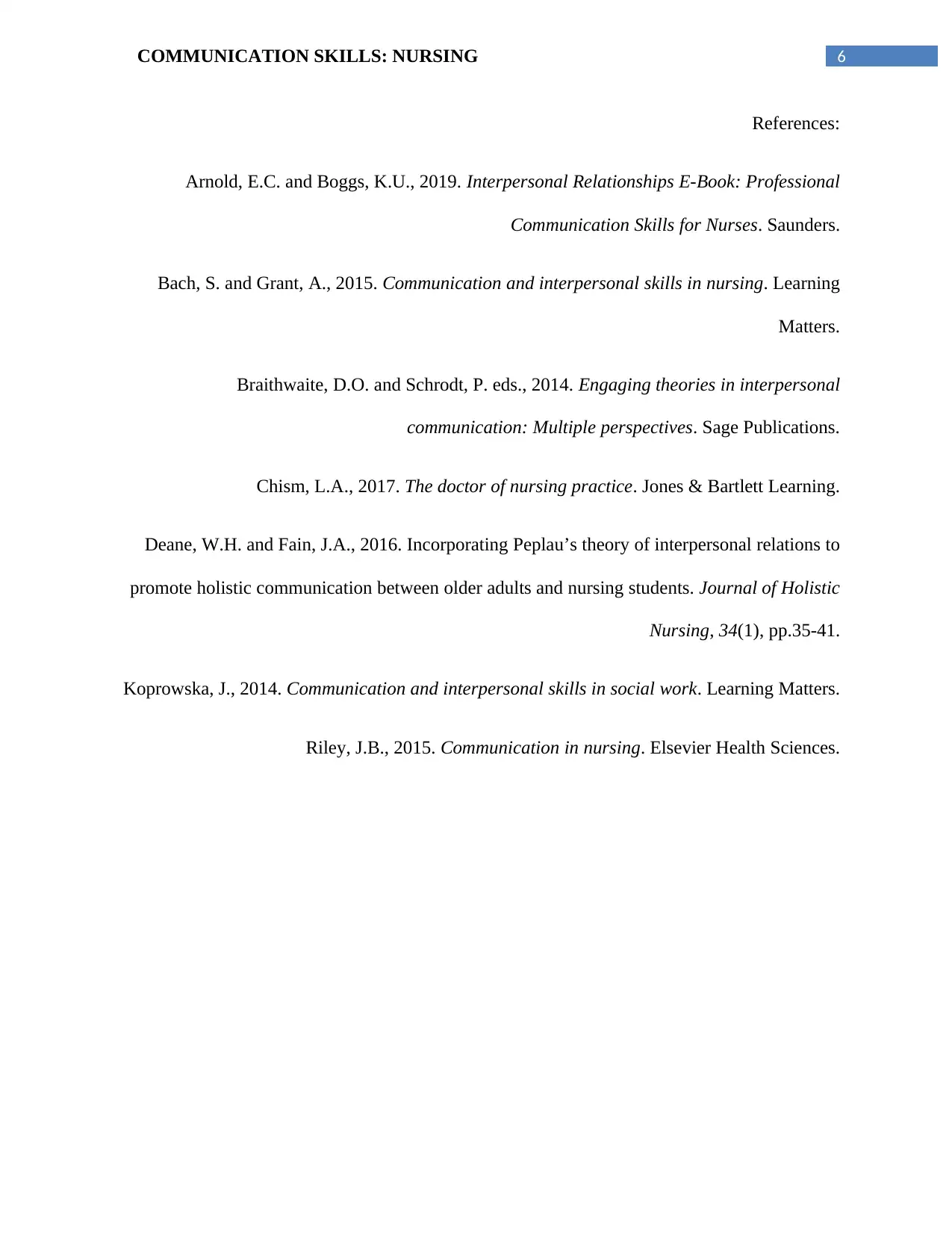
6COMMUNICATION SKILLS: NURSING
References:
Arnold, E.C. and Boggs, K.U., 2019. Interpersonal Relationships E-Book: Professional
Communication Skills for Nurses. Saunders.
Bach, S. and Grant, A., 2015. Communication and interpersonal skills in nursing. Learning
Matters.
Braithwaite, D.O. and Schrodt, P. eds., 2014. Engaging theories in interpersonal
communication: Multiple perspectives. Sage Publications.
Chism, L.A., 2017. The doctor of nursing practice. Jones & Bartlett Learning.
Deane, W.H. and Fain, J.A., 2016. Incorporating Peplau’s theory of interpersonal relations to
promote holistic communication between older adults and nursing students. Journal of Holistic
Nursing, 34(1), pp.35-41.
Koprowska, J., 2014. Communication and interpersonal skills in social work. Learning Matters.
Riley, J.B., 2015. Communication in nursing. Elsevier Health Sciences.
References:
Arnold, E.C. and Boggs, K.U., 2019. Interpersonal Relationships E-Book: Professional
Communication Skills for Nurses. Saunders.
Bach, S. and Grant, A., 2015. Communication and interpersonal skills in nursing. Learning
Matters.
Braithwaite, D.O. and Schrodt, P. eds., 2014. Engaging theories in interpersonal
communication: Multiple perspectives. Sage Publications.
Chism, L.A., 2017. The doctor of nursing practice. Jones & Bartlett Learning.
Deane, W.H. and Fain, J.A., 2016. Incorporating Peplau’s theory of interpersonal relations to
promote holistic communication between older adults and nursing students. Journal of Holistic
Nursing, 34(1), pp.35-41.
Koprowska, J., 2014. Communication and interpersonal skills in social work. Learning Matters.
Riley, J.B., 2015. Communication in nursing. Elsevier Health Sciences.
1 out of 7
Related Documents
Your All-in-One AI-Powered Toolkit for Academic Success.
+13062052269
info@desklib.com
Available 24*7 on WhatsApp / Email
![[object Object]](/_next/static/media/star-bottom.7253800d.svg)
Unlock your academic potential
Copyright © 2020–2026 A2Z Services. All Rights Reserved. Developed and managed by ZUCOL.





